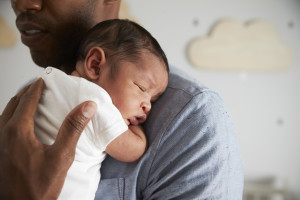Reducing the Risk of SIDS
 How to Keep Your Newborn Safe and Avoid the Risk of Sudden Infant Death
How to Keep Your Newborn Safe and Avoid the Risk of Sudden Infant Death
It is a nightmare that no parent should have to face. In the early days of your newborn’s life, when every breath is precious, and every decision is made with the utmost care for their safety and well-being, the idea that a child could lose her or her life in sleep is a devastation that is impossible to understand. In reality, according to the Centers for Disease Control and Prevention (CDC), in 2015, there were approximately 1,600 deaths due to Sudden Infant Death Syndrome (SIDS). 1,200 of the deaths were due to unknown causes, while about 900 were due to accidental suffocation and strangulation in bed.
Every parent wants to keep his baby safe—day and night. By remaining informed about the risks and potential causes of SIDS, you can help to minimize the risk to your child.
How to Minimize the Risk of SIDS in Your Home
Put your baby on his back during sleep and nap times. This long-held recommendation is still believed to be vital, as it increases his access to fresh air and reduces the chances of him overheating in the night, a known SIDS risk factor.
- Place baby in a bare crib with a firm mattress. Do not place bumper pads or other positioning devices, pillows, blankets, covers, or stuffed animals in the crib with your baby. Any items that can affect the baby’s re-breathing (breathing back in the air that was just breathed out) can affect your baby’s arousal, or his ability to wake up if in distress.
- Stay awake while feeding at night. Late night feeding sessions can be exhausting, but never fall asleep while breast or bottle feeding your baby. Make sure to put him back to bed safely when done to ensure he does not suffocate or choke.
- Offer baby a pacifier. If you are breastfeeding, once your baby can breastfeed, offer a pacifier. Make sure the pacifier is not attached to the baby or the crib in any way, as this could cause a choking hazard.
- Do not allow bed sharing. Never fall asleep with your baby in your bed, on a sofa, or in a chair. If your baby rolls in a way so that his mouth and nose are covered, he may not have the strength to reposition himself to obtain adequate oxygen. Also, do not allow your baby to share a bed with other infants of children in your household. Here are other sleep safety tips for newborns.
- Put baby to bed in your room. Keep your baby’s crib in your bedroom until he is about six months old and can roll over on his own. That way, you can be immediately available if you hear any indication that your baby is in distress.
- Make sure baby’s clothes won’t make him overheat. The clothes you put on your baby at night should keep him warm but should ensure he is not at risk of overheating. The temperature of your room is also a factor to help baby be comfortable during nap and sleep times.
- Do not smoke. Smoking exposes your baby to lung-damaging cigarette toxins.
- If you are able, breastfeed. Studies show that breastfed babies are typically healthier and more well rested.
- Encourage supervised tummy-time. Babies need to learn how to use their arms and core to lift their upper bodies off the ground. Plan for frequent sessions of supervised tummy time to give your baby a chance to work on these skills, but never in a crib or on a bed—always on a flat surface.
- Make sure you have a safe environment for baby when traveling. Call ahead to ensure the hotel has a crib you can use if you are not able to bring your own.
If you have observed even one incident in which your baby appeared not to be breathing, went limp, or turned blue, or if your baby gags excessively after spitting up, talk to your doctor or call 9-1-1 at once. If you have any other concerns regarding your baby or how to minimize the chance of SIDS, do not hesitate to speak with your doctor.
